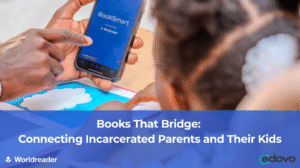Memories formed during our childhood are some of our most treasured because we’ve carried them with us for so many years. Many of us remember a childhood full of moments spent reading and exploring new places only books could take us.
As adults, we have the perspective to see that those moments of whimsy and excitement weren’t just happy memories, but defining moments in our growth.
The hours we spent getting lost in a story not only created a foundation for our education, but made us more innovative, dedicated, imaginative, and wise individuals.
It’s clearer in adulthood that a childhood full of promise starts with a book. And the earlier we start reading to or with our children, the better equipped they will be for their school careers and all of the adventure that comes after.
Here are a few of the most exciting benefits for young readers:
1. Starting readers young ignites imagination.
One second you’re thumbing through a book, and the next, you’re swept into a vibrant new world! Perhaps you’re trekking through lush rainforest, scoring the winning goal, or finally standing up to the bully. So what allows a reader to get lost in a book versus simply reading it? The key is imagination.
Cracking open a book allows young readers to fire up their imagination muscles and suspend reality for a bit. The earlier children begin reading and exploring these new worlds, the easier it becomes to create them for themselves.
Children fluent in imagination are more independent and free-thinking as they are able to keep themselves entertained with little assistance. Not only do these skills make for a more whimsical childhood, but more productive adulthood. With kindled imaginations, today’s young readers can become tomorrow’s creative leaders.
2. Starting readers young enhances communication.
From infancy, children are learning how to translate their needs, discomforts, and desires to us.
One of the most dramatic benefits of starting readers young is the improvement in communication. Reading aloud or with a young child expands their vocabulary by exposing them to words they may not be familiar with. A study from Ohio State University says that, “Young children whose parents read them five books a day enter kindergarten having heard about 1.4 million more words than kids who were never read to.” By establishing a growing tool kit of words, young readers are better equipped to articulate with others on a daily basis.
Familiarizing children with new stories also teaches them appropriate ways to handle social situations. Whether it’s reading a story with a conversation between a mother and son, an argument between friends, or a character ordering lunch at a cafe, books can give young kids insight into how to converse kindly and effectively.
3. Starting readers young inspires self-confidence.
As many of us remember, being a child came with its share of difficulties. Not only are you the smallest around, but a lack of knowledge and experience could make you feel even smaller. Reading to young children is a great way to build a foundation of self-confidence early.
Celebrate their small victories, from reading their first few words, to tackling their first full page, to finishing a first storybook cover to cover. When a child begins to approach literacy, they not only become proud of their own accomplishments, but more confident walking into school. Learning to read is no small feat, but the younger they begin, the quicker they improve, and the more confident they become in their ability to do hard things!
4. Starting readers young elongates attention spans.
In a world where instant gratification is more common than ever, children’s attention spans continue to shrink.
Longer attention spans allow us to indulge in deeper and distraction-free conversations, effectively improving our relationships. It allows us to master patience and keep our daily stress levels low. One of the best ways to ensure a healthy attention span for youth today is an early introduction to reading. Neuroscientist scientist Susan Greenfield agrees, and even emphasizes the importance of sharpening this skill early as the young brain contains more plasticity.
At first, it can be tricky getting a young child to concentrate on a book for a period of time. However, by implementing reading into their day-to-day schedule, and choosing books with intriguing chartered – and storylines – it may become trickier to pull your child away from a read!
5. Starting readers young unleashes understanding.
Reading heightens our understanding of the world around us. Not every family has the ability to travel the world but reading can fill in the blanks: children can see new faces, experience rich cultures and embark on daring adventures. It gives children the luxury and benefits of those experiences without ever leaving home.
By widening their world view at a young age, your child gains important insight to the world they live in. It also increases emotional understanding, enabling them to better learn how to identify, process, and deal with emotions when they arise.
6. Starting readers young unlocks educational opportunities.
People who read achieve better educational success, improve their earning potential, and lead healthier, happier lives. Reading is the core to education, and when it’s prioritized at a young age, more doors are opened and more opportunities for growth arise.
Those who struggle with reading, often face obstacles throughout their educational career. Research from the Casey Foundation shows that children who aren’t reading at grade level by the end of third grade are four times as likely to drop out of high school.
By starting your child reading early, they’ll likely experience less stress as they navigate the first few years of school, which can foster a life-long love of education and books.
Start reading with your child on our BookSmart app today.Sources:
https://worldlieracyfoundation.org/reading-enhances-imagination/
https://www.sciencedaily.com/releases/2019/04/190404074947.htm
https://www.pressreader.com/ireland/irish-daily-mail/20120828/282080569006833
https://eric.ed.gov/?id=ED518818




